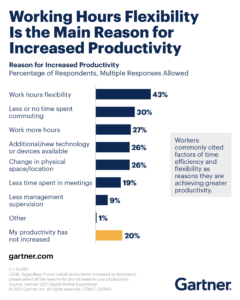The Future of Productivity: Impact of Flexible Working Hours on Productivity
Recently, especially the last couple of years, productivity has become the buzzword on everyone’s lips. In this article we will focus on the impact of workplace flexibility on productivity. When it comes to productivity and flexible working, a lot of questions arise.
- Does spending long hours at work lead to higher productivity?
- What is the impact of flexible working hours on productivity?
- Is it possible to increase productivity while still maintaining a healthy work-life-balance?
We will explore these questions in detail and leave you to decide if flexible working is the solution to your productivity goals. Have you ever found yourself glued to your computer screen for hours on end, with no light at the end of the tunnel? Whilst it’s tempting to believe that working long hours is the key to impressing the boss, the truth is that it’s not always the case.
Here’s why –
- Long working hours can have a negative impact on your productivity, decision-making skills and can decrease creativity.
- It can lead to fatigue, stress and burnout – all of which can negatively impact performance at work. No boss would be impressed by that! Organisations across the world have begun to acknowledge the negative impacts of long working hours on productivity as well as well-being.
A UK-based media agency, The7Stars, has a ‘Get Flexible’ policy that involves ditching the age-old timesheet approach and trusting the employees to get the job done without micro-managing the hours spent.
So, the next time you find yourself burning the midnight oil, remember that working long hours may seem like a shortcut to success, or a tool to impress your boss, but it can have negative consequences on your productivity and wellbeing in the long run.
So, what’s the solution?
Enter flexible working hours. Whilst the concept of flexible working hours has been around for a while, it has become increasingly popular in recent years. Breaking the 9-5 mould can help you find your balance.
Imagine this: It’s a beautiful sunny day and you remember promising your child a day at the beach the next time the sun was out… but you’re stuck in the office, staring at the clock and counting down the minutes until 5pm! When you finally get home, you’re too exhausted and once again, you feel like you’ve broken your promise to your child…
Today’s fast-paced world can leave you feeling like you’re missing out on life’s little pleasures. That’s where flexible working hours come in – they can be a game-changer when it comes to achieving a healthy balance between work and personal life. Two of the most prominent benefits of flextime are –
- It enables a better way to manage productivity, based on personal needs
- It gives returning mothers, students and those with caring commitments, the opportunity to work whilst fulfilling their other passions, responsibilities and personal commitments. A study conducted by Manpower Group Solutions, revealed that nearly 40% of global candidates consider workplace flexibility as one of the top three factors, this is something organisations are realising and acknowledging
- Flexible working hours can supercharge employee productivity. The question on everyone’s mind is – what is the impact of flexible work hours on employee productivity
So can flexible working hours improve productivity?
The answer is a resounding yes! The notion that flexible working hours and workplace productivity cannot co–exist is a common misconception that is prevalent in many organisations. The traditional 9-5 work schedule is no longer the only way to achieve productivity and organisations that embrace flexibility are seeing the benefits.In the Gartner 2021 Digital Worker Experience Survey, 43% of respondents said that flexible working hours helped them achieve more productivity. It is clearer than ever that employees who have greater control over their working hours are more productive and engaged at work.

- Flexible working arrangements allow employees to work during their most productive hours and manage their workload more effectively.
- Employees who are given the opportunity to work from home or remotely are often more productive, as they can work in an environment that is conducive to their individual work style and preferences.
We are convinced that flexible working hours and workplace productivity are two sides of the same coin, and when implemented correctly, they can work together to achieve higher levels of productivity and employee satisfaction.
To find out more about flexible working and flexible roles, contact [email protected] or 07815 541599.



